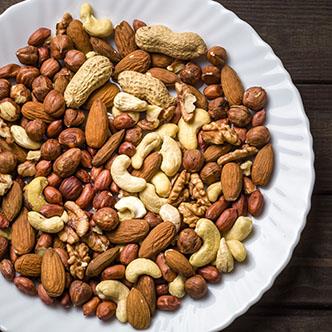
Nuts are an important part of a heart-healthy diet, based on a recent study that links regular nut consumption to 14% lower risk of heart disease.
Published in the Journal of the American College of Cardiology, this study explored the impact of nuts—specifically peanuts and walnuts—on heart health. Many studies have linked nut consumption to reduced risk for heart disease and heart events. However, the impact of specific types of nuts on cardiovascular risk is not well understood.
To learn more, researchers analyzed data from three U.S. studies of health professionals from 1980–2013. These studies included the Nurses’ Health Study, Nurses’ Health Study II and the Health Professionals Follow-up Study, all of which surveyed participants about their nut consumption every four years.
Together these studies included nearly 118,000 healthy adults who were free of heart disease at the start of the study.
After following participants for up to 32 years, there were a total of 14,135 cases of heart disease and stroke. Researchers found that participants consuming at least five servings of nuts a week had 14% lower risk of heart disease than those who never ate nuts. More specifically, researchers found that consuming peanuts at least twice a week and walnuts at least once a week was associated with 13–19% lower risk of heart disease.
According to authors, findings support current recommendations to increase nut consumption for the prevention of heart disease. Nuts are packed with heart-healthy fats, proteins, vitamins and minerals, and as this study confirms, they may protect heart health as part of a healthy diet.
However, it’s important to watch portion sizes, as one serving size of nuts is relatively small. In this study, one serving equaled one ounce of nuts, which is about one handful. One ounce can contain up to 200 calories. So while nuts are an important part of a heart healthy diet, a little goes a long way in protecting heart health and reducing risk for heart disease.